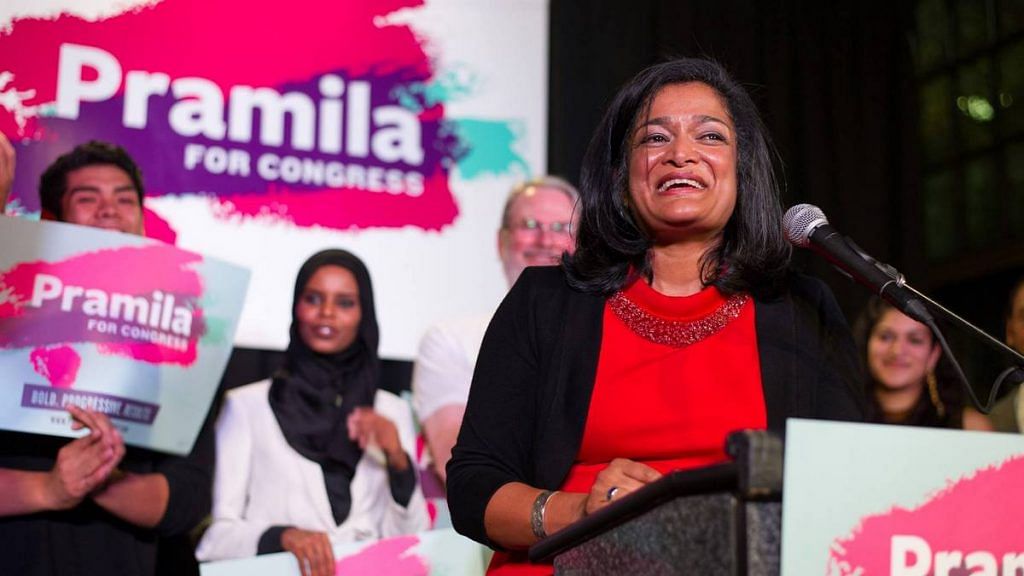New Delhi: The resolution on Kashmir by Indian-American Congresswoman Pramila Jayapal has so far managed to get only 29 cosponsors in the 435-member House of Representatives because there is an “increasing realisation” in the US Congress that the matter should be discussed “constructively” and not by embarrassing the Narendra Modi government, a top Indian official told ThePrint.
“Most Congressmen understand that the resolution is counterproductive and to the detriment of close India-US ties. There is a realisation that it is better to engage on the issue in a constructive manner,” said the official, who did not want to be named.
The Congressional resolution, which was introduced in the House of Representatives on 6 December 2019, urges the Modi government to lift restrictions on communications in Jammu and Kashmir, and preserve religious freedom for all residents.
“There is also sensitivity to the fact that a vast majority of Indian Americans are in favour of the government’s J&K initiative. Most Congressmen are briefed regularly on developments in J&K,” the official quoted above added.
The resolution enumerates the security challenges faced by India in Jammu and Kashmir and the continuing threat of state-supported cross-border terrorism. However, it also urges India to refrain from the use of threats and excessive force against peaceful protesters and those detained.
“I have fought to strengthen the special US-India relationship, which is why I’m deeply concerned. Detaining people w/out charge, severely limiting communications, & blocking neutral third-parties from visiting the region is harmful to our close, critical bilateral relationship (sic),” Jayapal had tweeted after introducing the resolution last month.
According to another Indian official, Jayapal has not been able to get even half of the total strength of the House due to the fact that many members of the US Congress, especially those with large Indian-American constituencies, feel “everything about Kashmir, including human rights concerns, is an internal issue that American legislators shouldn’t wade into”.
ThePrint reached Jayapal through email for a comment but there was no response until the time of publishing this report.
Also read: Not all flak from US, 6 lawmakers back Modi govt on Article 370, J&K clampdown
‘Having 29 cosponsors is not at the lowest end’
Indian diplomats have repeatedly made the rounds of the Capitol Hill, seat of the US government, since J&K’s special status was scrapped on 5 August. They have sought to urge members of the US Congress to focus on India-US ties instead of railing against internal matters like Kashmir, another Indian official said.
A diplomatic source said that Congress members, especially on the House’s side, have been consumed by the ongoing impeachment proceedings against US President Donald Trump. So a large number don’t have the “bandwidth to put Kashmir on their radar”.
The diplomatic source, however, added that Jayapal’s views might have far “more support in Congress than is apparent” because most members “do not want to publicly take a stand against India”.
“It is not uncommon for foreign affairs resolutions to not get public support because Congress tends to avoid expressing opinions through resolutions on matters that might upset good relations between the US and its key partners,” the diplomatic source said.
Alyssa Ayres, senior fellow for India, Pakistan and South Asia at the Council on Foreign Relations, said, “You can have legislation pass with more cosponsors as well as with a small number of cosponsors. Having 29 cosponsors is not at the lowest end. But I would also like to add that India continues to be very far off the US radar compared with other foreign policy priorities.”
Ayres, who is a former deputy assistant secretary of state for South Asia in the Barack Obama administration, added that Americans who are paying attention to India and Kashmir appreciate the “legitimate Indian concerns” about terrorism. But they also see the five months of detention without charges, for politicians and other leaders, as well as the longest-ever communication blockade in a democracy as “steps way out of line in a democracy”.
So far, Jayapal has not put the resolution to vote, which means it will not become a law. Therefore, sources said, the main significance of the resolution would be the optics and symbolic value of a “bipartisan Congressional resolution calling out India in a big way”.
Michael Kugelman, deputy director, Asia programme, and senior associate (South Asia) at The Wilson Center, said, Jayapal’s inability to get more supporters for her resolution may appear a victory of sorts for New Delhi but it is an “achievement if seen from a different perspective”.
“Given how pro-India Capitol Hill has been over the last few decades, I’d say it’s quite an achievement for Jayapal to have gotten more than two dozen cosponsors for a resolution that is uncompromisingly critical of India,” Kugelman added.
Also read: ‘Win over those who disagree’ — Jaishankar rebuff to Pramila Jayapal evokes mixed response
